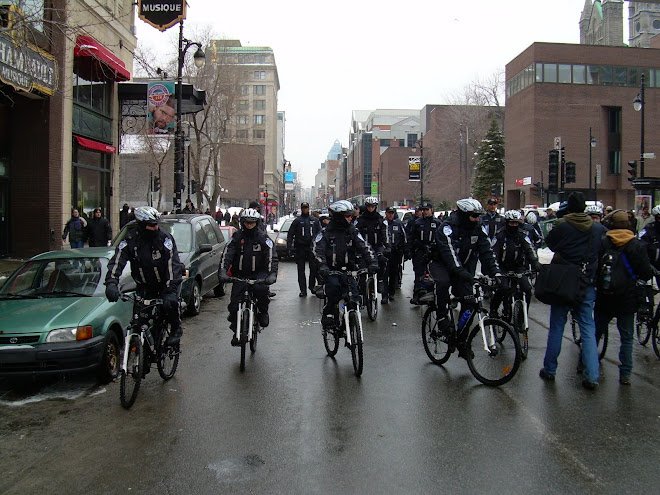One facet of discussions around the Greek upheaval of December and beyond that is manifested on some of the relevant discussion boards (on major anarchist portals) is the perhaps lamentably common split between those who see (potential) hope and resistance in limited insurrectionary or revolt-type protest actions, occupations, and even violence - and those who cast participants (particularly anarchists) as 'lifestylers' in it for the aesthetic and a (according to some analyses, essentially 'liberal') vision of autonomy and authenticity divorced from 'real' social struggle and progress against the vagaries of capitalism, statism, etc. This employs a set of oppositions already quite familiar on the radical left, one which pits (some) anarchists inclined towards making a show of resistance that might include actions against property and business interests or clashes with police and other representatives of state authority and more marxist-influenced actors (and many other anarchists) who might argue that this is counter-productive or pointlessly self-indulgent...not to mention more 'reformist' or 'moderate' activists who wish to maintain a strict code of non-violent protest/resistance. This facet, of course, reaches back well beyond some of its obvious past manifestations in the student communist/post-communist tensions is Paris 1968, the hippie/yippie/countercultural (Marxist, anarchist, and 'democratic') anti-war-and-more movements of the 1960s in the US (and Canada) - think Chicago 1968 - or, more recently, some of the controversies surrounding the anti-globalization movement (as realized in the squabbles after Seattle and the 'diversity of tactics' debates at Quebec City in 2001 and after). On an even broader historical scale, bits and pieces may well be traced all the way back to theoretical splits emanating from the First International (Marx/Bakunin) and on and on...
The ambiguities, debates and ambivalences around the topic of 'violence' are something I will have to blog shortly; I'm reading some interesting analysis by Uri Gordon (Anarchy Alive!, 2008, Pluto Press), Francis Dupuis-Deri (Les Black Blocs, 2007, Lux Editeur) and others on the academic side of things, and the discussion and general presentation of the 'violent' (do we include action against property, 'symbolic violence,' attacks against persons only?) in accounts of the events in Greece certainly furnish grist for the mill.
But for now, I'd just like to note that this is definitely ongoing - one aspect of it being the 'trolling' of anarchist forums by users who take any opportunity to suggest that all anarchists are essentially clueless, and to make explicit 'lifesyle' critiques equating the anarchists engaged in some of the more confrontational tactics (for example) with the supposedly self-indulgent adherents of subcultures built up around musical genres such as heavy metal or punk rock. Users of these forums, I might add, don't take this lying down, but actively dissect the unsympathetic messages (for example, noting that a poster is 'obviously a statist communist') as well as making the obvious observation that it may be less than productive or pleasant for people who think anarchists are clueless 'lifestylers' to spend their time trolling for a chance to intervene with essentially insulting 'contributions.'
Of course, there is also some degree of wrangling over the terms anarchist/anarchism/anarchy themselves, a rhetorical struggle that seeks to gain some measure of control over the 'definition(s)' and to lay claim to a perceived well of potential valorization to be derived from connecting oneself or one's aims to a particular set of historical theories, struggles and movements. In many ways, this is a valid and sincere exploit, as people are seeking to advance their own (sometimes very deeply felt and carefully analyzed) social-political ideas and positions. However, it also tends to entail a lot of sniping and can sometimes be a bit repetitious and predictable.
In terms of the construction of the Greek upheaval, one ends up - in some cases - with an interesting tension between a view of a given situation as a revolutionary 'seed' vs. a tendency to view manifold exaples of 'rioting' and struggle against authority as essentially equivalent [I have to note some that this notion has been highlighted in a recent exchange I've had on the subject with someone else]. Certainly, one of the earliest emphases of discussion s from back in December is the question of whether what was happening in Greece was likely to spread (for example, to the rest of Europe)...
Subscribe to:
Post Comments (Atom)


No comments:
Post a Comment